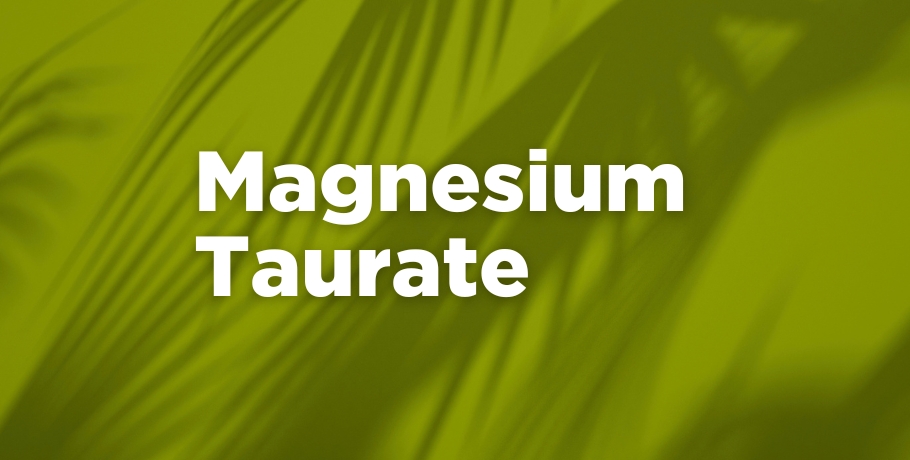Read time: 2-3 min

Definition
Magnesium taurate is a compound that combines magnesium with the amino acid taurine. It is commonly used as a dietary supplement to improve various health conditions and support the body's biochemical processes.
Chemical Composition
Magnesium taurate consists of magnesium ions bonded with taurine, an amino acid known for its calming and cardiovascular benefits. The chemical formula for magnesium taurate is Mg(C2H7NO3S)2.
Difference from Other Magnesium Compounds
Unlike other forms of magnesium, such as magnesium oxide, magnesium taurate offers unique benefits due to its combination with taurine. Taurine provides additional health advantages not found in other magnesium compounds.
What Are the Health Benefits of Magnesium Taurate?
- Support for the Nervous System: Magnesium and taurine together help maintain healthy nervous system function.
- Blood Sugar Regulation: Helps stabilise blood sugar levels.
- Improved Sleep Quality: Magnesium taurate can enhance sleep patterns by promoting relaxation and calmness.
- Stress Reduction: The combination of magnesium and taurine can reduce stress by regulating neurotransmitters.
How to Take Magnesium Taurate?
- Recommended Dosage: The recommended daily dosage varies depending on individual needs but typically ranges between 200–400 mg of total magnesium per day from supplements.
- Available Forms: Magnesium taurate is available in various forms, including capsules, tablets, and powders, to suit different preferences.
- Best Time to Take It: It is best taken in the evening or before bedtime to take advantage of its relaxing effects.
- Combining with Other Supplements: Magnesium taurate can be combined with other supplements such as vitamin B6 and zinc to enhance its effects.
What Are the Known Side Effects of Magnesium Taurate?
- Common Side Effects: Side effects may include stomach upset at high doses.
- Interactions with Medications: Magnesium taurate may interact with certain medications, including antibiotics and diuretics.
- Contraindications: People with kidney issues should consult a doctor before taking magnesium taurate.
Sources of Magnesium Taurate
- Natural Sources: Natural sources of magnesium include meat, and taurine is also found in meat and fish.
- Dietary Supplements: Magnesium taurate is available as a dietary supplement in capsule and powder form.
- Foods Rich in Magnesium and Taurine: Foods like dark chocolate are rich in magnesium, while shellfish and turkey are good sources of taurine.
How Does Magnesium Taurate Compare to Other Magnesium Supplements?
- Magnesium Citrate: Known for its high bioavailability and sometimes used to relieve mild constipation.
- Magnesium Oxide: Contains a high concentration of magnesium by weight but has the lowest bioavailability and may cause stomach discomfort. We do not recommend magnesium oxide.
- Magnesium Malate: Beneficial for energy production and muscle function. It is less likely to cause diarrhoea compared to other forms.
- Magnesium Glycinate: Known for its calming effects and high bioavailability, making it suitable for individuals with sensitive stomachs.
How to Choose Magnesium Taurate?
- Quality Criteria: Choose supplements that are third-party tested for purity and potency.
- Buying Tips and Recommendations: Ensure the product is from a reliable manufacturer and read reviews from other users to confirm quality.
- Magnesium M4: Contains magnesium glycinate, magnesium malate, magnesium citrate, and magnesium taurate of the highest quality.
